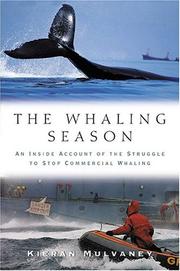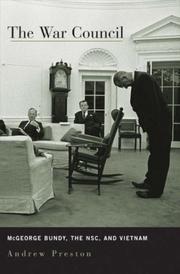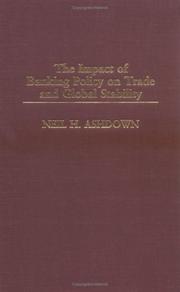| Listing 1 - 10 of 50 | << page >> |
Sort by
|

ISBN: 159726301X 9781597263016 1559639784 9781559639781 Year: 2003 Publisher: Washington, DC
Abstract | Keywords | Export | Availability | Bookmark
 Loading...
Loading...Choose an application
- Reference Manager
- EndNote
- RefWorks (Direct export to RefWorks)
Mulvaney, Kieran --- Travel --- Greenpeace International. --- Stichting Greenpeace Council --- Совет Гринпис --- Sovet Grinpis

ISBN: 0674056809 9780674056800 0674021983 9780674021983 9780674046320 0674046323 0674021983 9780674021983 Year: 2006 Publisher: Cambridge, Massachusetts ; London, England : Harvard University Press,
Abstract | Keywords | Export | Availability | Bookmark
 Loading...
Loading...Choose an application
- Reference Manager
- EndNote
- RefWorks (Direct export to RefWorks)
Was the Vietnam War unavoidable? Historians have long assumed that ideological views and the momentum of events made American intervention inevitable. By examining the role of McGeorge Bundy and the National Security Council, Andrew Preston demonstrates that policymakers escalated the conflict in Vietnam in the face of internal opposition, external pressures, and a continually failing strategy.Bundy created the position of National Security Adviser as we know it today, with momentous consequences that continue to shape American foreign policy. Both today's presidential supremacy in foreign policy and the contemporary national security bureaucracy find their origins in Bundy's powers as the first National Security Adviser and in the ways in which he and his staff brought about American intervention in Vietnam. Presidents Kennedy and Johnson were not enthusiastic about waging a difficult war in pursuit of murky aims, but the NSC's bureaucratic dexterity and persuasive influence in the Oval Office skewed the debate in favor of the conflict.In challenging the prevailing view of Bundy as a loyal but quietly doubting warrior, Preston also revises our understanding of what it meant--and means--to be a hawk or a dove. The War Council is an illuminating and compelling story with two inseparable themes: the acquisition and consolidation of power; and how that power is exercised.
Vietnam War, 1961-1975 --- Bundy, McGeorge. --- Bundy, Mac --- National Security Council (U.S.) --- United States. --- Sovet nat︠s︡ionalʹnoĭ bezopasnosti SShA --- Agentstvo nat︠s︡ionalʹnoĭ bezopasnosti (U.S.) --- NSC --- ANB --- United States --- Politics and government --- 1961-1963 --- 1963-1969
Book
ISBN: 1788211340 1911116045 9781911116042 1788210786 1911116037 9781911116035 9781788210782 Year: 2023 Publisher: Newcastle upon Tyne : Agenda Publishing,
Abstract | Keywords | Export | Availability | Bookmark
 Loading...
Loading...Choose an application
- Reference Manager
- EndNote
- RefWorks (Direct export to RefWorks)
To fully understand the Federal Reserve and its role today we need to examine its origins and the men who founded it. Using extensive archival sources, Richard Naclerio investigates the highly secretive events that surrounded the Fed's creation and the bankers, financiers, and tycoons that shaped both its organization and the role it was to play over the next century.
Federal Reserve banks. --- Financial institutions --- Banks of issue --- Board of Governors of the Federal Reserve System (U.S.) --- Sovet upravli︠a︡i︠u︡shchikh FRS --- Federal Reserve System (U.S.) --- F.R.S. --- FRS --- United States. --- Federal Reserve (U.S.) --- Federalʹnai︠a︡ rezervnai︠a︡ sistema (U.S.) --- Federal Reserve Board (U.S.) --- Federal Reserve banks --- E-books --- Monetary policy --- Bankers --- History.

ISBN: 3211279628 9783211279625 9786610625482 1280625481 3211335064 Year: 2006 Publisher: Wien ; New York : Springer,
Abstract | Keywords | Export | Availability | Bookmark
 Loading...
Loading...Choose an application
- Reference Manager
- EndNote
- RefWorks (Direct export to RefWorks)
The Council of Europe's Parliamentary Assembly took on the special task of monitoring the new Eastern member states and also the elder member states, for their adherence to the commitments they had entered into. This study examines the Council's legal bases, organisation and duties in this regard, basing the work on many legal acts and documents.
Constitutional law --- Constitutional amendments --- Droit constitutionnel --- Constitutions --- Amendements --- Council of Europe --- Council of Europe. --- European cooperation. --- European federation. --- Human rights -- Europe. --- Law - Europe, except U.K. --- Law - Non-U.S. --- Law, Politics & Government --- Constitutional lawCouncil of Europe. --- -Constitutional law --- -341.242 --- Constitutional limitations --- Constitutionalism --- Limitations, Constitutional --- Public law --- Administrative law --- Interpretation and construction --- Conseil de l'Europe --- Europarådet --- Evropeĭskiĭ sovet --- Европейский совет --- Symboulion tēs Eurōpēs --- Consiglio d'Europa --- Consiglio dell'Europa --- Consejo de Europa --- Europarat --- Raad van Europa --- Evropski savet --- Avrupa Konseyi --- Conselho da Europa --- Europäischer Rat --- Euroopan neuvosto --- Rada Europy --- Európa Tanács --- Europos Taryba --- Svet Evrope --- Consiliul Europei --- Sovet Evropy --- Rada I︠E︡vropy --- Рада Європи --- Evropis sabčo --- Avropa Şurası --- CoE --- Evropayi Khorhurd --- Savet Evrope --- Савет Европе --- EPUB-LIV-FT LIVDROIT SPRINGER-B
Book
ISBN: 1281276197 9786611276195 3540777946 3540777938 3642096514 Year: 2008 Publisher: Berlin : Springer,
Abstract | Keywords | Export | Availability | Bookmark
 Loading...
Loading...Choose an application
- Reference Manager
- EndNote
- RefWorks (Direct export to RefWorks)
A concise analysis of the evolution of monetary policy and banking institutions over the past sixty years that stresses the dynamic interactions between the Federal Reserve and banking institutions that resulted from financial market innovations. Institutions were influenced by increasing competition in markets and monetary policies. The book consists of two parts, which are organized chronologically. The first has chapters that correspond with terms of chairmen of the Federal Reserve Board. It critically analyzes decisions taken by the Federal Open Market Committee in each period and argues that innovations forced changes in the design and conduct of monetary policy. The second part analyzes how banking institutions evolved from a very conservative and regulated system in 1945 to highly inventive financial firms and how this evolution has affected the distribution of credit, wealth, and income in the US.
Monetary policy --- Banks and banking --- Board of Governors of the Federal Reserve System (U.S.) --- Sovet upravli︠a︡i︠u︡shchikh FRS --- Federal Reserve System (U.S.) --- F.R.S. --- FRS --- United States. --- Federal Reserve (U.S.) --- Federalʹnai︠a︡ rezervnai︠a︡ sistema (U.S.) --- Federal Reserve Board (U.S.) --- Macroeconomics. --- Public finance. --- Macroeconomics/Monetary Economics//Financial Economics. --- Public Economics. --- Cameralistics --- Public finance --- Currency question --- Economics --- Public finances
Book
ISBN: 1606923218 1614703191 9781614703198 9781606923214 Year: 2009 Publisher: New York
Abstract | Keywords | Export | Availability | Bookmark
 Loading...
Loading...Choose an application
- Reference Manager
- EndNote
- RefWorks (Direct export to RefWorks)
Board of Governors of the Federal Reserve System (U.S.). --- Monetary policy -- United States. --- Monetary policy --- Finance --- Business & Economics --- Money --- Board of Governors of the Federal Reserve System (U.S.) --- Sovet upravli︠a︡i︠u︡shchikh FRS --- Federal Reserve System (U.S.) --- F.R.S. --- FRS --- United States. --- Federal Reserve (U.S.) --- Federalʹnai︠a︡ rezervnai︠a︡ sistema (U.S.) --- Federal Reserve Board (U.S.) --- BUSINESS & ECONOMICS / Banks & Banking --- E-books

ISBN: 1567205224 9786610908462 1280908467 0313011710 9780313011719 9781567205220 9781280908460 661090846X 9798400668784 Year: 2002 Publisher: Westport, Conn. Quorum Books
Abstract | Keywords | Export | Availability | Bookmark
 Loading...
Loading...Choose an application
- Reference Manager
- EndNote
- RefWorks (Direct export to RefWorks)
BUSINESS & ECONOMICS --- International / Economics --- Balance of payments --- Monetary policy --- Banks and banking --- International finance. --- Board of Governors of the Federal Reserve System (U.S.) --- United States --- Commerce. --- International monetary system --- International money --- Sovet upravli︠a︡i︠u︡shchikh FRS --- Federal Reserve System (U.S.) --- F.R.S. --- FRS --- United States. --- Federal Reserve (U.S.) --- Federalʹnai︠a︡ rezervnai︠a︡ sistema (U.S.) --- Federal Reserve Board (U.S.) --- Finance --- International economic relations
Book
ISBN: 0262012499 0262254980 1282240420 9786612240423 9780262254984 9781282240421 6612240423 9780262012492 Year: 2009 Publisher: Cambridge, Mass. MIT Press
Abstract | Keywords | Export | Availability | Bookmark
 Loading...
Loading...Choose an application
- Reference Manager
- EndNote
- RefWorks (Direct export to RefWorks)
Monetary policy --- Banks and banking, Central --- Federal Reserve banks. --- Federal Reserve banks --- Finance --- Business & Economics --- Money --- Board of Governors of the Federal Reserve System (U.S.) --- Sovet upravli︠a︡i︠u︡shchikh FRS --- Federal Reserve System (U.S.) --- F.R.S. --- FRS --- United States. --- Federal Reserve (U.S.) --- Federalʹnai︠a︡ rezervnai︠a︡ sistema (U.S.) --- Federal Reserve Board (U.S.) --- Banks of issue --- E-books --- Monetary policy - United States --- Banks and banking, Central - United States
Book
ISBN: 1681140756 9781681140759 9781937536176 1937536173 Year: 2012 Publisher: Cochran, Ga.
Abstract | Keywords | Export | Availability | Bookmark
 Loading...
Loading...Choose an application
- Reference Manager
- EndNote
- RefWorks (Direct export to RefWorks)
Finance --- Banks and banking --- Federal Reserve banks. --- Banks of issue --- Agricultural banks --- Banking --- Banking industry --- Commercial banks --- Depository institutions --- Financial institutions --- Money --- Funding --- Funds --- Economics --- Currency question --- History --- Board of Governors of the Federal Reserve System (U.S.) --- Sovet upravli︠a︡i︠u︡shchikh FRS --- Federal Reserve System (U.S.) --- F.R.S. --- FRS --- United States. --- Federal Reserve (U.S.) --- Federalʹnai︠a︡ rezervnai︠a︡ sistema (U.S.) --- Federal Reserve Board (U.S.) --- Federal Reserve banks --- E-books
Book
ISBN: 1299456979 0199947090 9780199947096 9780199947089 0199947082 9781299456976 019999109X Year: 2013 Publisher: New York : Oxford University Press,
Abstract | Keywords | Export | Availability | Bookmark
 Loading...
Loading...Choose an application
- Reference Manager
- EndNote
- RefWorks (Direct export to RefWorks)
This title explores the complex intellectual and cultural roots of Greenpeace, tracing the development of the organization from its emergence amidst the various protest movements of the 1950s and 1960s to the end of its volative, dramatic, and at times quirky first decade in 1980.
Environmental protection --- Antinuclear movement --- Environmentalism --- Counterculture --- Counter culture --- Countercultures --- Culture --- Hippies --- Subculture --- Anti-nuclear movement --- Antinuclear protest movement --- Nuclear freeze movement --- Protest movement, Antinuclear --- Social movements --- Nuclear disarmament --- Nuclear power plants --- Environmental quality management --- Protection of environment --- Environmental sciences --- Applied ecology --- Environmental engineering --- Environmental policy --- Environmental quality --- Political aspects. --- History. --- Greenpeace International --- Stichting Greenpeace Council --- Совет Гринпис --- Sovet Grinpis --- Greenpeace, Affaire (1985) --- Environnement --- Mouvement antinucléaire --- Écologisme. --- Contre-culture. --- Protection --- Aspect politique. --- Histoire. --- Mouvement antinucléaire --- Écologisme.
| Listing 1 - 10 of 50 | << page >> |
Sort by
|

 Search
Search Feedback
Feedback About UniCat
About UniCat  Help
Help News
News